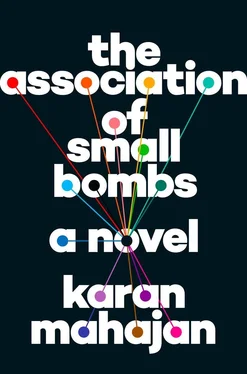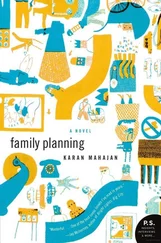But they were tied to the house. He’d inherited it from his father. He owned the flat jointly with his siblings, and it was difficult to imagine selling it: Who would want to live this deep in a complex full of Khuranas, even if the address were a posh one? Would his siblings allow it? (It occurred to him that, in the circumstances, yes, they would.) Mostly, it was difficult to fathom the complexity of selling, setting a price, transporting one’s stuff, homing in on a new place — tiring. When you came down to it, this flat was the only security they had, the only immutable thing, even if it were bloodied from the insides with memories of the boys, Tushar waddling about in his giraffe-patterned pajamas and ordering around the servant, Nakul lounging in his hep overlarge T-shirts, surprising Vikas with his catlike stare. It was because of the house that he’d stuck to Delhi and not moved to Bombay, where the film industry was concentrated. It was easier to make documentaries if you weren’t terribly strapped for cash and worrying about meeting the rent and if, by the luck of good inheritance, you had a decent address.
Foolish, he thought. I should have risked it and moved. Then this would have never happened and it would have been better for my career, which withered in Delhi, surrounded by family — people who judged my choices and my way of life without trying to understand.
Vikas had a fever. Since the day of the blasts, he’d been consumed by such what-ifs (the initial embargo on them, imposed for the sake of his wife, out of a temporary maturity that comes to a man when he feels he is in a historic phase of his life, having been lifted). Every way he turned, his past was detonated, revealing tunnels and alternative routes under the packed, settled earth of the present. For every decision there were a million others he could have made. For every India, a Pakistan of possibilities.
When things are good, you can see no other way of living; when things are in ruins, there appear a million solutions for how this fate could have been avoided. He blamed himself for all sorts of decisions: for turning down money (he’d been offered a commercial project on the strength of his documentaries but had rejected it on cranky artistic grounds), for not taking another job (his brother had offered him a position at his travel agency when he was particularly low, living off loans from the family), for cowardice (why had he been so afraid of trying his hand in Bombay, of fleeing his festering ancestral womb?). He blamed himself for selfishness (why had he persisted with this career that so clearly made his children ashamed? All the fathers of their friends were industrialists who took their kids on holidays to Jungfrau and bought them Parker pens for their schoolwork). But mostly, he felt trapped with his consequences in the flat, in this flat with its terrazzo floors and yellow post-partition walls and views across the street of the home of a technology czar, a sleek set of buildings muscled through with old, hard, thick Rajasthani-looking wood — a fashionable touch recommended by an architect, no doubt, the same one who had recommended that the pool be shielded from view of the prying neighbors. Are there any women in this house? Vikas wondered, coming to the window. He had vaguely known that the IT czar’s daughter was a classmate of Nakul’s, but he had never seen her or her mother — not even at the funeral rites for the boys, which the czar attended alone, looking freshly barbered and shaved in his white safari suit and designer slippers, slippers he carried in his hands out of fear of the shoe-keeper at the temple misplacing them.
They must drive up in their tinted Mercedes and be docked directly into the air lock of the portico of the Spanish-Rajasthani villa, Vikas thought.
What am I supposed to do? he wondered. How am I supposed to respond to this thing that has happened to me? A few weeks ago I was standing here, looking through this garbled, pearly whorled window for my kids on the street, seeing instead the servants skulking under the ashokas. Now they’re gone, forever, no matter how long I stay here like faithful Hachiko, from their English reader. And yet I have an urge to stay here forever. An urge to punish myself by looking, by scouring every inch of tarred road and glittering gutter and veined dust-sprinkled leaf, in every season, at all times, for my boys — to look till I go blind or mad, till my brain revolts, staging a headache in the space where I am trying to insert the entire city by looking.
His heart moved like a rudder through the icy seas of his chest. Vikas was a tall man with a patrician forehead and a rude thatch of hair; he took it in his hand in wild bunches. He did not move from the window. His eyes — wide-set, mobile, vulnerable — blinked more than normal. His thighs, muscular yet thin, like pipes, burned with tension. Outside, on the street, the wind unfurled a serpent’s tongue of dust through the colony, pushing the organic detritus a few feet, little bits of shattered leaf getting stuck in blisters of tar. Horns. No cars turning the corner. Leaping sunlight. No boys.
________
The next hearing kept getting postponed. The government would set a date only to cancel it at the last minute and propose another in a month. Deepa began to slip. “Maybe they’re not even guilty,” she said one day, wiping her forehead in the kitchen. Behind her blazed the dismal kingdom of the countertops, the cracked surface strewn with cut-up ingredients, fossilized dhania, and powder. “I was reading in the Hindu ,” she said, “that one of the boys they picked up was sixteen and he had come from Kashmir for the summer holidays, to stay with his brother, who sells papier-mâché things at Dilli Haat.”
The Khuranas were cut-and-dried secularists and liberals. They took the left-wing position on everything. They read the Hindu , the Asian Age , and the Hindustan Times ; subscribed to Outlook rather than the saffronized India Today ; were among the special coterie of urbanites who counted the crusading P. Sainath as their favorite journalist; were partisans of DD-2’s The News Tonight under NDTV, which they felt had been better in its hour-long avatar as The World This Week ; were opposed to globalization and the monstrous coming of McDonald’s and KFC (why do you need McDonald’s if there’s a Wimpy? Vikas wondered); were against the BJP, which had sprung to power for thirteen days right before the boys had died, the government lasting only long enough to encompass the blast. And of course, they had a few token Muslim friends, like the Ahmeds, of whom they were inordinately proud — whom they had cultivated partly (though not entirely) to give ballast to their secular credentials. Therefore, had they been on the other side of the blast, or rather not on any side, but outside its murderous circumference, they too would have doubted the speedy arrest of the terrorists, the conflicting but confident storylines offered by the police, the heartless manner in which the suspects had been held for a month before being produced for trial.
Of course, being victims, they’d had to suppress all that.
“What are they saying?” Vikas asked, buying time. In fact, he didn’t care whether the terrorists were guilty or innocent. The four men standing in the court were like the obligatory impurities in a paperweight: They were just there. A thing to hold down time. One more new room for the Khuranas to pass through. And how did it matter if they were guilty or innocent, if his kids had already died? How could the suffering of these suspects, even if it was greatly exacerbated by being wrongly jailed, approach his own? On the way out of the court, he had seen a woman with reddish hair crying, her head bent low, hands gripping the sides of the plastic chair, two crooked front teeth visible at the top of the cave of her glistening, depthless, open mouth — he had seen this woman and his heart had tightened and he had assumed she was a nameless mother of the nameless dead in the blast. Now he wondered if she was the mother of one of the young terrorists and his heart leapt again — not for the terrorists, but for her, for how alone she must have been in that courtroom, surrounded by people who hated her and her son.
Читать дальше












